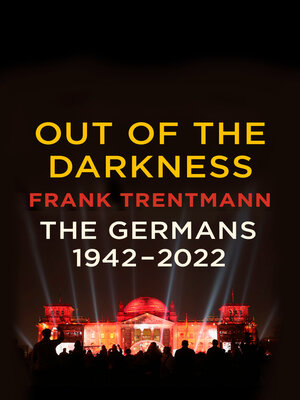
Sign up to save your library
With an OverDrive account, you can save your favorite libraries for at-a-glance information about availability. Find out more about OverDrive accounts.
Find this title in Libby, the library reading app by OverDrive.



Search for a digital library with this title
Title found at these libraries:
| Loading... |
#1 Most Important Political Book of 2023, Sueddeutsche Zeitung (Germany)
A Best Book of 2023, The Telegraph (Great Britain)
A gripping and nuanced history of the German people from World War II to the war in Ukraine, including revealing new primary source material on Germany's transformation
In 1945, Germany lay in ruins, morally and materially. Its citizens stood condemned by history, responsible for a horrifying genocide and war of extermination. But by the end of Angela Merkel’s tenure as chancellor in 2021, Germany looked like the moral voice of Europe, welcoming more than one million refugees, holding together the tenuous threads of the European Union, and making military restraint the center of its foreign policy. At the same time, Germany's rigid fiscal discipline and energy deals with Vladimir Putin have cast a shadow over the present. Innumerable scholars have asked how Germany could have degenerated from a nation of scientists, poets, and philosophers into one responsible for genocide. This book raises another vital question: How did a nation whose past has been marked by mass murder, a people who cheered Adolf Hitler, reinvent themselves, and how much?
Trentmann tells this dramatic story of the German people from the middle of World War II through the Cold War and the division into East and West to the fall of the Berlin Wall and the struggle to find a place in the world today. This journey is marked by a series of extraordinary moral conflicts: admissions of guilt and shame vying with immediate economic concerns; restitution for some but not others; tolerance versus racism; compassion versus complicity. Through a range of voices—German soldiers and German Jews; displaced persons in limbo; East German women and shopkeepers angry about energy shortages; opponents and supporters of nuclear power; volunteers helping migrants and refugees, and right-wing populists attacking them—Trentmann paints a remarkable and surprising portrait spanning eighty years of the conflicted people at the center of Europe, showing how the Germans became who they are today.
A Best Book of 2023, The Telegraph (Great Britain)
A gripping and nuanced history of the German people from World War II to the war in Ukraine, including revealing new primary source material on Germany's transformation
In 1945, Germany lay in ruins, morally and materially. Its citizens stood condemned by history, responsible for a horrifying genocide and war of extermination. But by the end of Angela Merkel’s tenure as chancellor in 2021, Germany looked like the moral voice of Europe, welcoming more than one million refugees, holding together the tenuous threads of the European Union, and making military restraint the center of its foreign policy. At the same time, Germany's rigid fiscal discipline and energy deals with Vladimir Putin have cast a shadow over the present. Innumerable scholars have asked how Germany could have degenerated from a nation of scientists, poets, and philosophers into one responsible for genocide. This book raises another vital question: How did a nation whose past has been marked by mass murder, a people who cheered Adolf Hitler, reinvent themselves, and how much?
Trentmann tells this dramatic story of the German people from the middle of World War II through the Cold War and the division into East and West to the fall of the Berlin Wall and the struggle to find a place in the world today. This journey is marked by a series of extraordinary moral conflicts: admissions of guilt and shame vying with immediate economic concerns; restitution for some but not others; tolerance versus racism; compassion versus complicity. Through a range of voices—German soldiers and German Jews; displaced persons in limbo; East German women and shopkeepers angry about energy shortages; opponents and supporters of nuclear power; volunteers helping migrants and refugees, and right-wing populists attacking them—Trentmann paints a remarkable and surprising portrait spanning eighty years of the conflicted people at the center of Europe, showing how the Germans became who they are today.






